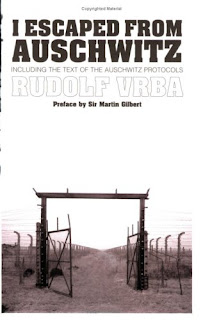The Holocaust.
A black page in our history.
WWII was a world war to never forget with casualties that make your head swim and renders you fainthearted, but the Holocaust was a particular dark decision made by the socialist leader, Hitler, that took Europe back to the middle ages.
There were many concentration camps througout Poland and its neighbouring countries, most of them designed to decimate the jewish population. Some did this in a crude manner of having jews dig their own graves before killing them, but Auschwitz-Birkenau left the world speechless.
Multiple crematoria used to kill jews not by tens or hundreds or even thousands, but a capacity of eventually killing 12000 people on one day. Families, children, elderly, women, men, it was the most serene genocide the world has ever known.
I Escaped From Auschwitz tells you the story why this went on for so long without any revolts from the victims, how life was between the walls of this mass murder machine designed by Himmler.
We meer Rudi, the author of this book, when the war is already a fact and jews are already singled out. When you want to know more about the progress of semitism during the war, watch The Pianist.
Rudi, however, wants to escape his dire faith and tries to run to Hungary. In the end he gets caught and is sent to Majdanek.
Due to circumstances he gets sent forth to Auschwitz which was lucky for him because in Majdanek eventually everyone is killed in the most gruesome way. He lost his brother in that camp.
When he first catches sight of Auschwitz he can't but notice the sign Arbeit macht Frei. He's still thinking of escaping one day. While others die around him, he seems to get more priviliged and eventually finds a way to escape Auschwitz.
His account of what happened during those years he spend in Auschwitz saved more than a half million Hungarians. He could've saved more, had he known that for the jews to serenely go to their death, the SS had to work together with their jewish leaders. They trusted their judgment and paid for that trust with their life.
It's a horrific, heartbreakingly sincere and a struggle to read and understand what happened during the Holocaust.
The anger, the fear, the horror. It's almost to much to believe, but human nature can be formed into something dangerous when molded consistently. How could it be that so many people got to be that afraid of one nation?
How could so many turn their backs to people they once must have called their neighbours?
How is it, that someone with a family, can coldheartedly kill entire families?
Why did they do it? How did they make their soldiers continue to do this? How could they find so many people willing to perform genocide? Just like that?
This book left me with so many questions.
And we can't forget.
Because once we forget, it could happen again.
Rudolf Vrba is a hero. He and his friend, Alfred Wetzler, made the allied to believe the genocide was actually taking place. Without him, many more would've died.
